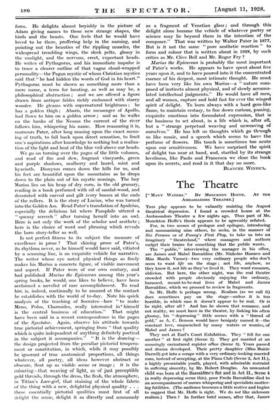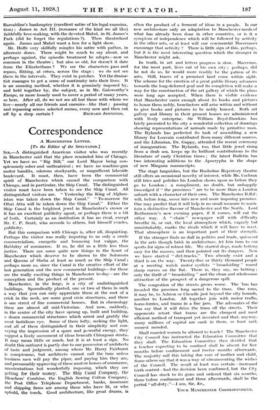The Theatre
[" MANY WATERS." BY MONCRTON HOFTE. AT TDB AMBASSADORS THEATRE.] Tins play appears to be valiantly resisting the August theatrical depression. I found a crowded house at the Ambassadors Theatre a few nights ago. Thus part of Mr. Monckton Hoffe's thesis appears to be agreeably refuted.
For, in two scenes of prologue and epilogue, introducing and summarizing nine others, he seeks, in the manner of Six Persons or of Fanny's First Play, to take us into an imaginary " theatreland," where managers and authors cudgel their brains for something that the public wants.
The " public," interviewing the manager in his office, are James and Mabel Barcaldine (Mr. Nicholas Hannen and Miss Marda Vanne)—two very ordinary people who don't seem to want life on the stage ; not life, anyhow, as they know it, not life as they've lived it. They want romance,.
oblivion. But here, the other night, was the real theatre crowded with people obviously enjoying the ordinary, harassed, meant-to-be-real lives of Mabel and James Barcaldine, which we proceed to review in fragments.
So Mr. Hoffe is perhaps wrong. Realism (as we call it) does sometimes pay on the stage—unless it is too horrible, in which case it doesn't appear to be real. Or is he right, after all ? And has he shown that romance, and not reality, we must have in the theatre, by linking his often gloomy, his " depressing " little scenes with a " thread of gold," as A. C. Benson would have benignly named it—the constant love, unquenched by many waters or worries, of Mabel and James ?
They met at Earl's Court Exhibition. They " fell for one another " at first sight (Scene 2). They got married at an amusingly caricatured register office (Scene 8). Years passed and drama developed. Their pretty daughter (Miss Maisie Darrell) got into a scrape with a very ordinary-looking married man, instead of accepting, at the Plaza Club (Scene 2, Act H.), a highly presentable youth, played, with admirable restraint in suffering sincerity, by Mr. Robert Douglas. An unwanted child was born at the Barealdine's flat and in Act II., Scene 4 (a really depressing scene this), poor Freda Barcaldine died to an accompaniment of nurses whispering and specialists mutter- ing futilities. (The audience becomes a little restive and begins to suggest that Mr. Hoffe is right. We do not like sickroom realism ) Then ? In further brief scenes, after that, James
Barcaldine's bankruptcy (excellent satire of his legal examine_ tion) ; James in Act III. (romance of the kind we all hie) faithfully love-making, with the devoted Mabel, in St. James's Park (did he forget the regulations ?). Then theatreland again. James and Mabel want a box for a light show.
Mr. Hoffe very skilfully mingles his satire with pathos, in alternate doses. There might be much to say about, and perhaps against, the episodic treatment he adopts—now so common in the theatre ; but also so old, for doesn't it date from the Elizabethans ? We see the characters pass and repass, flitting, at crises, across the stage : we do not see them in the intervals. They exist in patches. Yet the drama- tist manages to get a sense of continuity into their lives. It is an amusing method, whether it is genuinely imposed by, and held together by, the subject, as in Mr. Galsworthy's Escape, or more loosely used to cover a period of many years, as here. After all, do we not see all but those with whom we live—nearly all our friends and enemies—like that : passing and repassing across selected scenes, every now and then cut





























 Previous page
Previous page